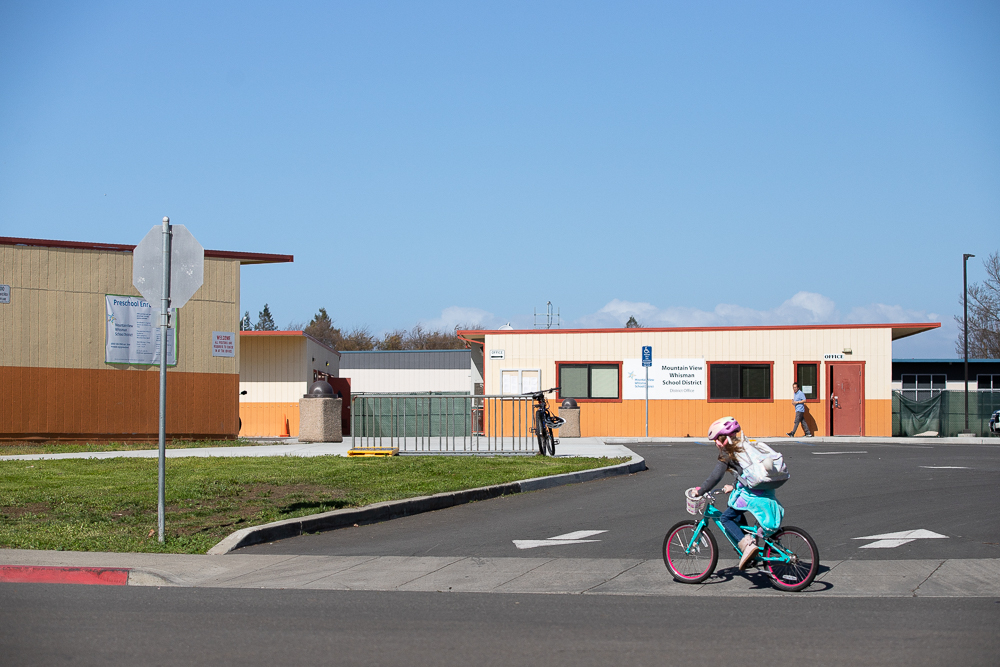The Mountain View Whisman School District and its teachers union have reached a tentative three-year contract agreement with the help of an outside mediator who was brought in after negotiations broke down in January.
The deal, which covers the current and following two school years, would lock in pay increases for teachers and set defined working hours, but leave class sizes the same for the time being. The union and district have both signaled support for the agreement, which still requires a formal vote by both the district's teachers and school board.
The accord comes after talks hit a wall earlier this year, with the union declaring an impasse after a Jan. 18 negotiating session, saying that the district was unwilling to budge on working conditions, instead only wanting to address salary. Teachers also objected to the idea of a multi-year locked contract that didn't offer the possibility for annual negotiations.
The district said it wanted the stability and certainty of a long-term contract and that it was willing to offer teachers substantial raises, but believed class sizes and working hours were on par with neighboring districts.
An outside mediator was called in to facilitate discussions, which ultimately led to the current deal.
Laying out the details of the contract
The agreement would give teachers a 5% raise this school year, plus a 2% one-time bonus. Teachers would then receive a 4% raise in each of the next two school years. That's the same pay increase that non-teaching staff and management are receiving under contracts the school board approved in February.
Teacher pay in the district currently ranges from $68,535 to $122,872, depending on education level and the number of years spent working for the school district.
The agreement also sets a defined working day of seven hours and 10 minutes, places limits on the number of staff meetings that will be scheduled, increases pay for teachers who fill in for absent colleagues and raises the stipend that teachers receive for earning certain degrees and credentials, according to a draft of the agreement that the union shared with the Voice. The hourly rate that teachers receive for certain additional hours worked is also being increased.
General classroom teachers will receive extra pay if they are instructed to attend more than five hours of meetings to set up education plans for students with disabilities. Case managers who work with disabled students will get one day set aside per month for planning and preparation work.
The contract wouldn't impact class sizes and further negotiations would be closed for the following two school years. The district and union have both said they support the agreement.
"This is a really good thing," Superintendent Ayinde Rudolph said in an interview. "It allows us to take a step back and breathe – and really focus on the needs of our kids and getting back to normal."
Rudolph added that it will be positive to have the predictability for both staff and administrators that a fixed contract provides, with pay increases known ahead of time.
Union president Sean Dechter told the Voice that the union feels this is a fair contract and that through mediation the district started to meet the union halfway on working conditions.
"MVEA is satisfied with the tentative agreement that was reached," Dechter said. "We do look forward to more progress on class size reduction in future negotiations."
Both sides acknowledged that lowering class sizes would be a particularly costly proposition because it requires hiring more teachers.
Although the agreement defines a seven-hour-and-10-minute work day, Rudolph noted that it will still allow the district to keep the same length of school day for students.
While Dechter said he was pleased to reach a compromise with the district, he also said that he wished the negotiations hadn't gone to mediation in the first place.
"I'm a little disappointed that it took a mediator to help the district through negotiations, when I think they didn't really need to have someone step in if they negotiated well," Dechter said.
For his part, Rudolph said that he believes two years of almost non-stop negotiations took a toll and that both the union and district could have done a better job of understanding the concerns that the other side had. The pandemic meant that over the past two years, the district and union had to negotiate agreements on closure and distancing learning, plus the eventual campus reopening, on top of regular contract negotiations for three school years.
"All of us are really tired and I really feel like that is what's taking its toll and that's why people felt like they weren't being listened to, on both sides," Rudolph said.



Comments